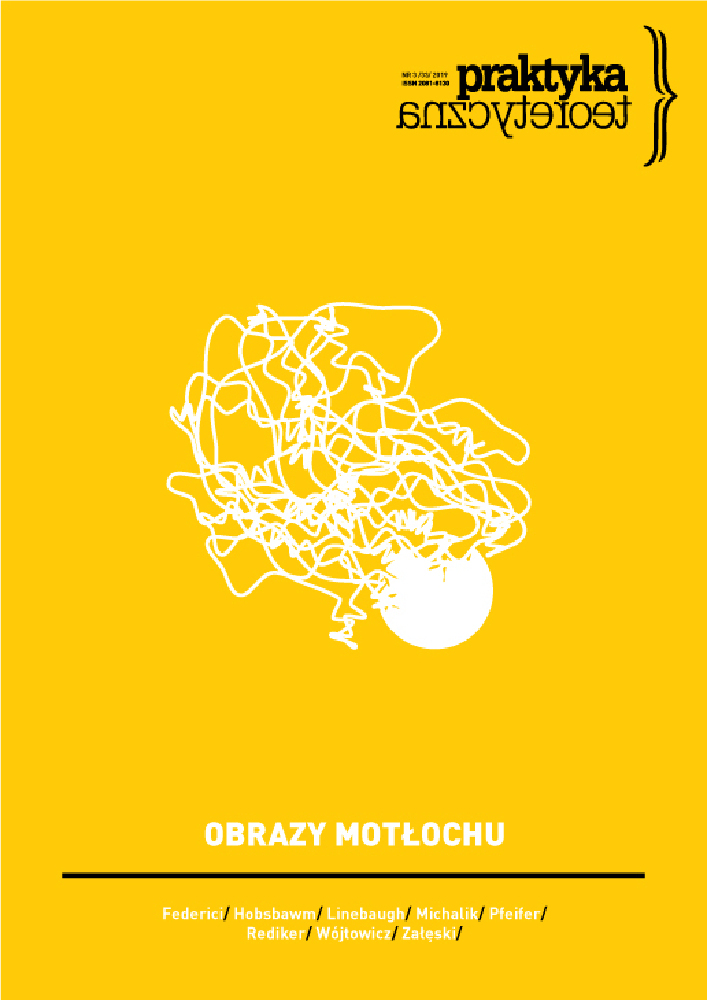Abstract
The essay is a translation of a chapter of Eric Hobsbawm’s classic book Primitive Rebels. Hobsbawm attempted to create an ideal model of a social bandit by analysing examples of European brigands from the thirteenth to the twentieth century. In the second part of the essay, the author reflects on the political potential of a social bandit, i.e. whether this kind of activity can effectively undermine existing hierarchies.
Transl.: Michał Pospiszyl
References
Alongi, Giuseppe. 1887. La Maffia nei suoi fattori e nelle sue manifestazioni; studio sulle classi pericolose della Sicilia. Turin: Fratelli Bocca. https://archive.org/details/lamaffianeisuoi00alongoog.
Arshinov, Peter. 1974. History of the Makhnovist Movement (1918–1921). Detroit: Black & Red. http://www.ditext.com/arshinov/makhno.html.
Avrich, Paul. 1967. The Russian Anarchists. Princeton: Princeton University Press. https://libcom.org/history/russian-anarchists-paul-avrich.
Becker, Johann Nikolaus. 1804. Actenmässige Geschichte der Räuberbanden an den beyden Ufern des Rheins. Cologne: Keil.
Blunt, John Henry. 1874. Dictionary of sects, heresies, ecclesiastical parties, and schools of religious thought. London: Rivingtons.
Bourde. Paul. 1887. En Corse, l’esprit de clan. Les moeurs politiques. Les vendettas. Le banditisme. Paris: C. Lévy.
Chamberlin, William Henry. 1965. The Russian Revolution. New York: Grosset & Dunlap.
Croce, Benedetto. 1892. Angiolillo (Angelo Duca) capo di banditi. Napoli: Lugi Pierro. https://archive.org/details/angiolilloangelo00croc/page/n13.
Ferracuti, Franco, Renato Lazzari i Marvin E. Wolfgang E. (red.). 1970.
Violence in Sardinia. Rome: Mario Bulzoni.
Footman, David. 1961. „Nestor Makhno”. W David Footman, Civil War in Russia. New York: Praeger.
Ganci, Massimo. 1954. „II movimento dei Fasci nella provincia di Palermo”. Movimento Operaio 6.
Doria, Gino. 1931. „Per la storia del brigantaggio nelle province meridionali”. Archivio Storico per le Province Napoletane 17.
Hammond, John Lawrence i Barbara Bradby Hammond. 1920. The village labourer, 1760–1832: A study in the government of England before the reform bill. London: Longmans, Green. https://archive.org/details/villagelabournew00hammuoft.
Hobsbawm, Eric J. 1971. Primitive Rebels: Studies in archaic forms of social movement in the 19th and 20th centuries. Manchester: Manchester University Press.
Keep, John L.H. 1956. „Bandits and the Law in Muscovy”. Slavonic Review 35.
Labry, Raoul. 1923. Autour du Moujik. Paris: Payot.
Lucarelli, Antonio. 1942. Il brigantaggio politico del Mezzogiorno d’Italia dopo la seconda restaurazione borbonica (1815–1818): Gaetano Vardarellie Ciro Annicchiarico. Bari: Laterza.
Lucarelli, Antonio. 1946. Il brigantaggio politico nelle Puglie dopo il 1860. Il sergente Romano. Bari: Laterza
Maffei, Count (red.). 1865. Brigand life in Italy: A history of Bourbonist reaction. London: Hurst and Blackett. https://archive.org/details/brigandlifeinit04monngoog.
Maxwell, Gavin. 1956. God preserve me from my friends. London: Longmans Green and Co.
Molfese, Franco. 1964. Storia del brigantaggio dopo l’Unità. Milan: Feltrinelli.
Morselli, Enrico Agostino i Santé de Sanctis. 1903. Biografia di un bandito, Giuseppe Musolino di fronte alla psichiatria ed alla sociologia, studio medicolegale e considerazioni. Milano: Treves. https://archive.org/details/biografiadiunban00mors.
Olbracht, Ivan. 1953. Mikoła Szuhaj zbójnik. Tłum. Helena Gruszczyńska-Dubowa. Warszawa: Państwowy Instytut Wydawniczy.
Pani Rossi, Enrico. 1868. La Basilicata, libri tre: studi politici, amministrativie di economia publica. Verona: Coi Tipi di G. Civelli. https://archive.org/details/labasilicatalib00rossgoog.
Peruta, Franco della. 1954. „La banda del Matese e il fallimento della teoria anarchica della modema Jacquerie in Italia”. Movimento Operaio 3.
Pitt-Rivers, Julian. 1954. People of the Sierra. New York: Criterion Books. https://archive.org/details/peopleofthesierr001911mbp.
Puzo, Mario. 2017. Sycylijczyk. Tłum. Jan Jackowicz. Warszawa: Wydawnictwo Albatros.
Racioppi, Giacomo. 1867. Storia dei moti di Basilicata e delle provincie contermine nel 1860. Napoli: Tipografia di Achille Morelli. https://archive.org/details/bub_gb__o4brKmxy4EC.
Rontini, Eugenio. 1893. I briganti celebri. Firenze: A. Salani. Spano, Velio. 1954. Il banditismo sardo e i problemi della rinascita. Roma: Editori Riuniti.
Woolsey, Gamel. 1939. Death’s Other Kingdom. London: Eland.
Zugasti Sáenz, Julián de. 1876. El Bandolerismo: Estudio social y memorias históricas (1876–1879). Madrid: Imp. de T. Fortanet. http://www.bibliotecavirtualdeandalucia.es/catalogo/es/consulta/registro.cmd?id=100110.
License
“Theoretical Practice” seeks to put into practice the idea of open access to knowledge and broadening the domain of the commons. It serves the development of science, thinking and critical reflection. The journal is published in open-access mode under the CC-BY-NC-SA 4.0 license (detail available here: http://creativecommons.org/licenses/by-nc-sa/4.0/). Articles published in the journal may be freely distributed, stored, printed and utilized for academic and teaching purposes without restrictions.
They should not be, however, used for any commercial purposes or be reconstructed into derivative creations. Access to the journal may not be limited or offered for a fee by any third party.
Prospective authors are obliged to fill in, sign and send back the publishing contract compliant with the CC licencing. [PL.pdf, PL.doc, EN.pdf,EN.doc].
According to this contract, authors grant the journal a non-exclusive right to publish their work under the creative commons license (CC-BY-NC-SA 4.0) without any financial obligation on both sides of the contract.
Before submission authors should make sure that derivative materials they use are not protected by copyright preventing their non-commercial publication. Authors are responsible for any respective copyright violations.
